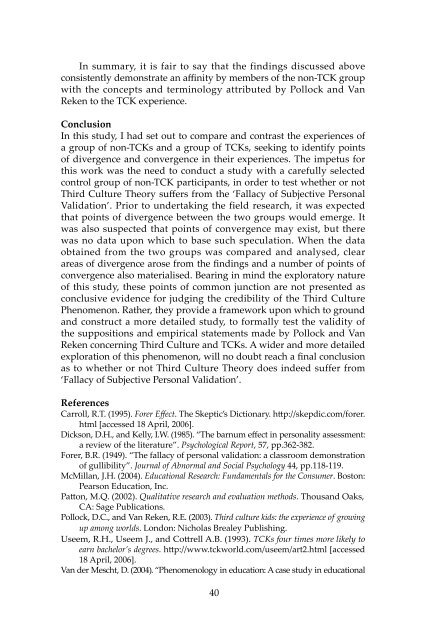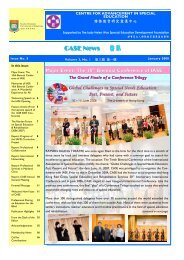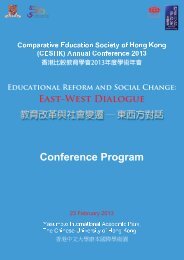Comparative Education Bulletin - Faculty of Education - The ...
Comparative Education Bulletin - Faculty of Education - The ...
Comparative Education Bulletin - Faculty of Education - The ...
Create successful ePaper yourself
Turn your PDF publications into a flip-book with our unique Google optimized e-Paper software.
In summary, it is fair to say that the findings discussed above<br />
consistently demonstrate an affinity by members <strong>of</strong> the non-TCK group<br />
with the concepts and terminology attributed by Pollock and Van<br />
Reken to the TCK experience.<br />
Conclusion<br />
In this study, I had set out to compare and contrast the experiences <strong>of</strong><br />
a group <strong>of</strong> non-TCKs and a group <strong>of</strong> TCKs, seeking to identify points<br />
<strong>of</strong> divergence and convergence in their experiences. <strong>The</strong> impetus for<br />
this work was the need to conduct a study with a carefully selected<br />
control group <strong>of</strong> non-TCK participants, in order to test whether or not<br />
Third Culture <strong>The</strong>ory suffers from the ‘Fallacy <strong>of</strong> Subjective Personal<br />
Validation’. Prior to undertaking the field research, it was expected<br />
that points <strong>of</strong> divergence between the two groups would emerge. It<br />
was also suspected that points <strong>of</strong> convergence may exist, but there<br />
was no data upon which to base such speculation. When the data<br />
obtained from the two groups was compared and analysed, clear<br />
areas <strong>of</strong> divergence arose from the findings and a number <strong>of</strong> points <strong>of</strong><br />
convergence also materialised. Bearing in mind the exploratory nature<br />
<strong>of</strong> this study, these points <strong>of</strong> common junction are not presented as<br />
conclusive evidence for judging the credibility <strong>of</strong> the Third Culture<br />
Phenomenon. Rather, they provide a framework upon which to ground<br />
and construct a more detailed study, to formally test the validity <strong>of</strong><br />
the suppositions and empirical statements made by Pollock and Van<br />
Reken concerning Third Culture and TCKs. A wider and more detailed<br />
exploration <strong>of</strong> this phenomenon, will no doubt reach a final conclusion<br />
as to whether or not Third Culture <strong>The</strong>ory does indeed suffer from<br />
‘Fallacy <strong>of</strong> Subjective Personal Validation’.<br />
References<br />
Carroll, R.T. (1995). Forer Effect. <strong>The</strong> Skeptic’s Dictionary. http://skepdic.com/forer.<br />
html [accessed 18 April, 2006].<br />
Dickson, D.H., and Kelly, I.W. (1985). “<strong>The</strong> barnum effect in personality assessment:<br />
a review <strong>of</strong> the literature”. Psychological Report, 57, pp.362-382.<br />
Forer, B.R. (1949). “<strong>The</strong> fallacy <strong>of</strong> personal validation: a classroom demonstration<br />
<strong>of</strong> gullibility”. Journal <strong>of</strong> Abnormal and Social Psychology 44, pp.118-119.<br />
McMillan, J.H. (2004). <strong>Education</strong>al Research: Fundamentals for the Consumer. Boston:<br />
Pearson <strong>Education</strong>, Inc.<br />
Patton, M.Q. (2002). Qualitative research and evaluation methods. Thousand Oaks,<br />
CA: Sage Publications.<br />
Pollock, D.C., and Van Reken, R.E. (2003). Third culture kids: the experience <strong>of</strong> growing<br />
up among worlds. London: Nicholas Brealey Publishing.<br />
Useem, R.H., Useem J., and Cottrell A.B. (1993). TCKs four times more likely to<br />
earn bachelor’s degrees. http://www.tckworld.com/useem/art2.html [accessed<br />
18 April, 2006].<br />
Van der Mescht, D. (2004). “Phenomenology in education: A case study in educational<br />
40
















